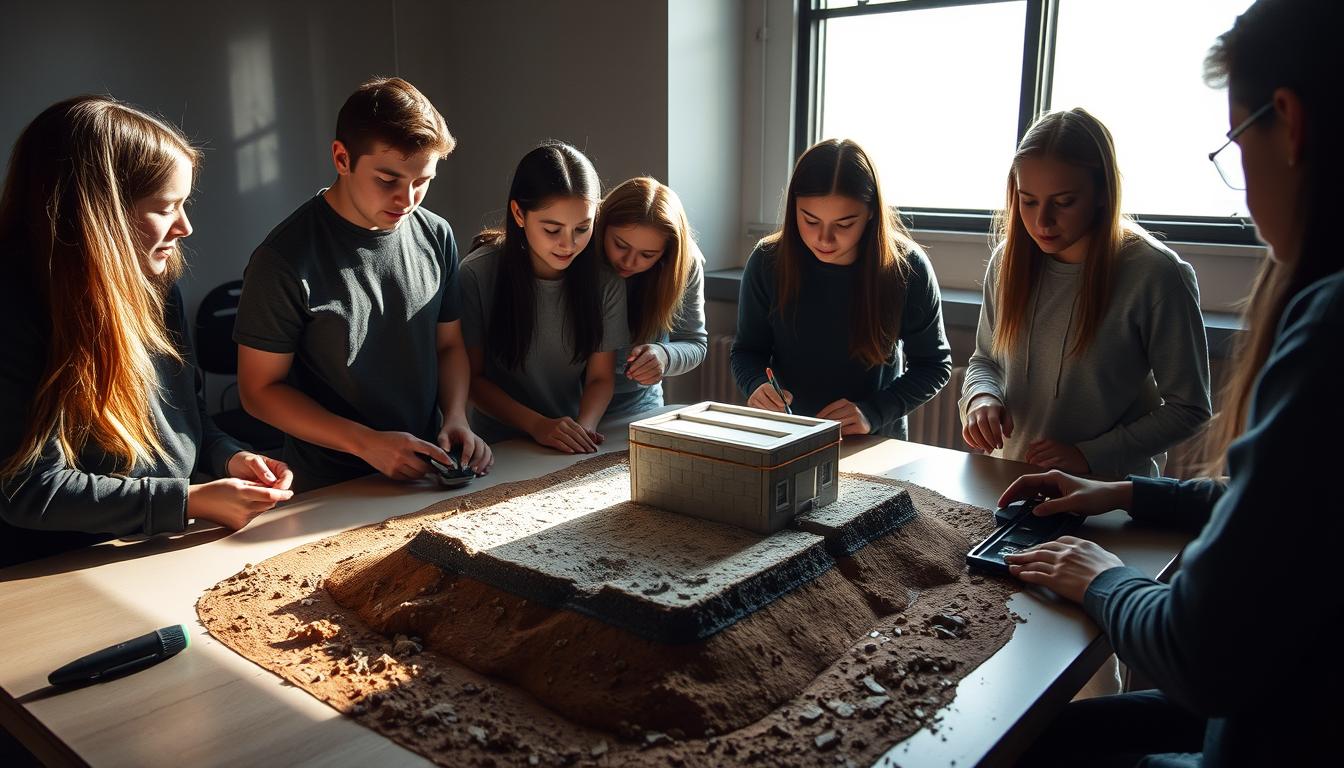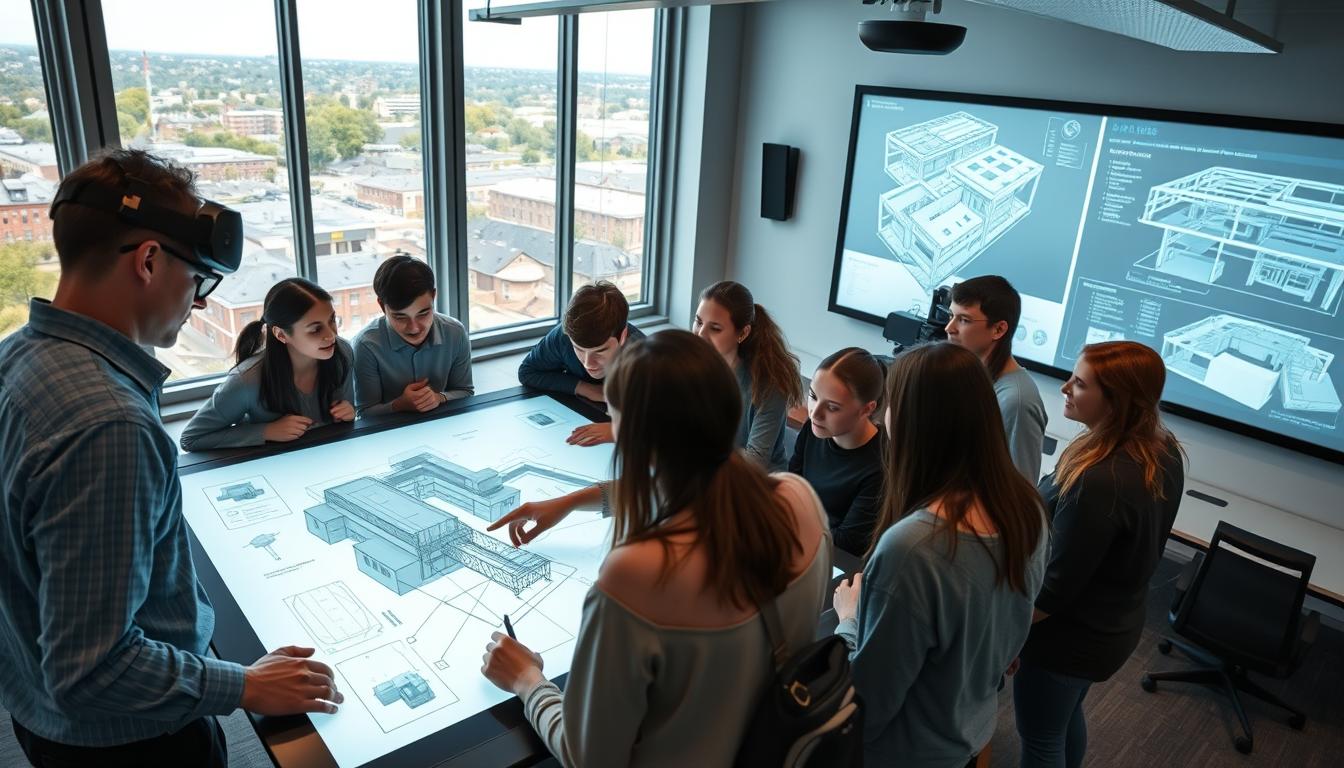Anúncios
Imagine if the future of teaching structural engineering was through games, not textbooks. This idea is becoming more real as the need for strong structures grows. Games are now key in teaching engineering students the right way to detail structures.
These games don’t just keep students entertained. They also help them learn and remember how to detail correctly. Let’s dive into how games are changing engineering education and why detailing is so important today.
Introduction to Structural Detailing
Structural detailing is key in engineering. It makes sure all parts of a building work together well. This keeps the whole project safe and stable.
Anúncios
Today’s buildings are getting more complex. So, getting the details right is more important than ever.
In engineering schools, new tools are being used. These tools help students understand how buildings stand up. They make learning fun and interactive.
These tools are changing how we teach engineering. Students get to practice what they learn in real-life situations. This makes them better at structural detailing.
Anúncios

The Importance of Precision in Structural Engineering
In structural engineering, precision is key for safety and reliability. It deals with how well a building can handle loads and how strong its materials are. Every detail matters to ensure a structure is stable and works well.
Understanding Structural Integrity
Structural integrity means a building can handle its load without failing. It depends on the materials, design, and how well it’s built. Knowing engineering well helps avoid problems caused by small mistakes.
Errors and Their Consequences
Building mistakes can harm a structure’s integrity. These errors might come from wrong calculations, bad materials, or team communication issues. The results can be costly, damage a firm’s reputation, and put people at risk.
Being careful and precise helps avoid these problems. It creates a culture of exactness in engineering.

Overview of Structural Detail Training Games for Engineering Students
Training games for engineering students are key to improving structural detail education. They offer a space for students to tackle complex engineering ideas in a safe setting. This approach lets students apply what they’ve learned to real problems.
These games help students develop important skills for structural detailing. They put students in real-world situations, making learning more hands-on. This interactive style boosts learning and prepares students for their future roles.
Adding training games to the curriculum motivates and prepares students for their careers. They focus on teaching structural details, making them vital for engineering students.
How Games Enhance Learning in Engineering
Games make learning in engineering fun and interactive. They offer students a chance to dive into immersive experiences. These games use gamification to keep students engaged and thinking critically.
Students can try out different solutions and learn from their mistakes. This is all done in a safe space.
Studies show that using games in learning can boost academic results. These games make learning engineering concepts fun and easy. This approach motivates students to learn more.
By playing these games, students get to practice what they’ve learned. This mix of hands-on experience and academic learning helps them understand engineering better. It prepares them for the real world.
Types of Structural Detail Training Games
Educational games are a new way to learn about structural detailing. There are many types of games, each with its own way to help students learn. They make learning fun and help students understand important concepts in structural engineering.
Simulation Games
Simulation games create real-life engineering scenarios. Students can practice their skills in a safe way. They can try out different parts of structures and see how they work.
Interactive Software Applications
Interactive software helps students design and analyze structures. It lets them see their ideas come to life and solve problems. This way, they learn by doing and get better at understanding structures.
Virtual Reality Environments
Virtual reality in education is a new and exciting way to teach. It lets students explore and interact with structures in 3D. This hands-on learning helps them remember important details better.
Key Features of Effective Training Games
Effective training games have key features that make learning fun and engaging for engineering students. One major feature is real-time feedback. This lets learners get instant feedback on their actions. It helps them understand concepts better and adapt quickly.
Real-Time Feedback Mechanisms
Real-time feedback makes learning in these games better. Students see the effects of their choices right away. This helps them make better decisions and learn more effectively.
Adaptive Learning Techniques
Adaptive learning makes the game fit each student’s learning style. It changes the game’s difficulty based on how well you’re doing. This way, everyone learns at their own pace and gets the most out of the game.
Popular Games in Structural Detailing Education
Games have changed how we learn about engineering. They are now a big part of teaching structural detailing. These games help students understand complex ideas better.
They make learning fun and interactive. Students get to practice what they learn in a real-world setting.
Case Study: Game-Based Learning Impact
Studies show that games make learning engineering better. One example is how certain games improved student focus and memory. These games let students see how their designs work in real life.
Feedback from Users and Educators
People who use these games love them. Students say they’re more excited about learning structural detailing. They like how games make learning fun.
Teachers also see great results. They say these games help students work together better. They also improve critical thinking and make learning fun.
Benefits of Using Games for Structural Detailing
Using games in structural detailing education has big benefits for students and teachers. Games make learning fun and engaging, especially in engineering. This is key for students to stay motivated and learn well.
Games help students remember what they learn. By playing, they use what they know in real-life situations. This makes their understanding of structural detailing stronger. It also helps them think critically and solve problems, skills needed for engineers.
Games also let students practice without the dangers of real projects. They can try different scenarios and learn from their mistakes. This helps them become more precise in their work.
Studies show that learning through games meets industry needs. Students who learn this way are ready for engineering jobs. They know how to use digital tools and methods, which is what employers want.
Challenges in Introducing Game-Based Learning
Game-based learning has many benefits but also faces challenges. Overcoming these hurdles is key to its success. Technical issues and getting institutions on board are major obstacles.
Technical Limitations
Technical problems are a big challenge. The cost of needed hardware and software can be high. Also, poor internet can disrupt learning.
Having reliable technology is crucial. It helps make game-based learning effective.
Acceptance by Traditional Institutions
Getting institutions to accept game-based learning is hard. They often stick to old ways like lectures. This makes it tough for new methods to take hold.
It’s important to show the benefits of game-based learning. Sharing success stories and evidence can help change minds.
Future Trends in Structural Detailing Games
The future of education games, especially in structural detailing, is set for big changes. New technologies will make learning better. Artificial intelligence will help make lessons fit each student’s needs.
New tools like augmented reality and virtual platforms will change how we learn. Students will get to explore complex structures and techniques in a hands-on way. This will help them understand important concepts better.
More schools and game makers will work together. This will lead to new, effective ways to teach engineering. These partnerships will make sure games stay relevant and useful in today’s fast-changing world.
These changes will make structural detailing games a key part of education. The mix of tech and learning will make studying more fun and effective. It will create a better way to learn and grow.
Implementing Game-Based Learning in Curriculums
Game-based learning in engineering curriculums is a fresh way to teach. It makes learning fun by using game mechanics that tackle real-world problems. Games are designed to be interactive and effective, linking what students learn to their interests.
Incorporating Game Mechanics in Course Design
Adding game mechanics to courses needs a smart plan. Teachers should use points, levels, and quick feedback to keep students motivated. These elements help students understand complex ideas better, just like in real engineering work.
Students get to enjoy learning through challenges and rewards in games. This makes learning both fun and meaningful.
Teachers need training to use game-based learning well. Knowing how to mix old teaching methods with new game elements makes learning better. As teachers get better at this, students learn in a fun, interactive way that boosts their thinking and problem-solving skills.
Potential for Collaboration between Game Developers and Educators
Collaboration in education is changing the game for training tools in structural detailing. Game developers and educators have skills that complement each other well. Together, they can make games that meet engineering students’ learning needs.
These partnerships can bring big improvements to educational resources. Game developers know how to make things interactive and engaging. Educators know what students need to learn and how they learn it. This teamwork ensures the games are up-to-date and relevant.
Innovative games can change how we learn. They make complex ideas in structural detailing easier to understand and fun. When game developers and educators work together, they can create powerful learning experiences.
| Collaboration Benefits | Game Developers’ Contribution | Educators’ Contribution |
|---|---|---|
| Enhanced Learning Experience | Creating interactive scenarios and narratives | Providing educational frameworks and learning outcomes |
| Relevance to Industry | Incorporating real-world applications | Ensuring curriculum alignment with industry standards |
| Increased Student Engagement | Designing immersive gameplay mechanics | Understanding student motivations and learning styles |
By combining game developers’ creativity with educators’ knowledge, we can revolutionize engineering education. This collaboration leads to learning experiences that truly connect with students. It prepares them better for their future careers.
Case Studies of Successful Game Implementations
Many studies show how games can change engineering training. They show how games can make learning fun and effective. For example, schools have seen better grades when students play educational games.
At a university, students used a game to learn about building structures. They said they understood it better and felt more confident. Their grades went up a lot.
Another study used games to teach design. Students who played these games did better in real projects. This shows games can help in many ways.
The table below shows the good results from these studies:
| Case Study | Game Used | Results |
|---|---|---|
| University A | LoadMaster Simulation | Increased retention rates by 30%, higher satisfaction scores |
| Institution B | Structure Builder App | Notable GPA improvement, better application of core principles |
| College C | Virtual Engineering Challenge | 85% of students felt more engaged, 40% increase in project completion |
These studies show games can really help in engineering classes. They give teachers new ways to teach. This helps students connect what they learn to real-world problems.
Evaluating the Effectiveness of Training Games
Checking if training games work well in teaching structural detailing is key. It helps make learning better for engineering students. We need to see how these games help students remember what they learn and get better at practical skills.
Assessing Learning Outcomes
When we check how well students learn, we look at many things. We compare their scores before and after playing the game. We also watch how engaged they are and ask for their thoughts in surveys.
This helps us see if the game is really helping students get ready for real-world problems.
| Metric | Pre-Game Score | Post-Game Score | Engagement Level |
|---|---|---|---|
| Knowledge Retention | 65% | 85% | High |
| Practical Skills Application | 70% | 90% | Medium |
| Feedback Satisfaction | N/A | N/A | 80% |
Having a strong way to check if training games work is important. It shows how well they teach and where they can get better. By always checking and improving, we make sure students are ready for their jobs.
Conclusion
Game-based learning is changing how engineering students learn about structural detailing. These games make learning fun and precise. They offer a hands-on experience that traditional methods can’t match.
Students get to practice complex concepts in a fun way. This approach boosts their skills and understanding. It’s a dynamic way to learn.
As education changes, using games in learning will become more important. These tools help students grasp and apply what they learn. They make learning more engaging and effective.
This shift in education prepares students for the challenges of the future. It’s a forward-thinking way to teach structural detailing. It helps students develop the skills they need to succeed.
In the future, technology will play a bigger role in education. Games will be key in teaching engineering. They help create engineers who are skilled and innovative.
By using games, we can prepare a new generation of engineers. They will be ready to face the challenges of structural engineering. This approach is essential for their success.
FAQ
What is the role of games in enhancing skills for structural detailing in engineering?
Games are key in improving students’ skills in structural detailing. They offer interactive learning that boosts engagement. This allows students to apply theoretical concepts safely and practically.
How does precision impact structural engineering?
Precision is crucial in structural engineering. It ensures structures are safe, durable, and strong. Mistakes can cause failures, increase costs, and pose safety risks. Thus, detailed training is essential.
What types of training games are available for engineering students?
Engineering students can use various games. There are simulation games that mimic real scenarios, interactive software for modeling, and virtual reality for better understanding of structures.
What are the key features of effective training games?
Good training games offer real-time feedback and adapt to each student’s learning pace. This makes learning more effective and enjoyable.
Why are some games particularly popular in structural detailing education?
Certain games are loved because they boost student engagement and understanding. They improve learning outcomes and foster teamwork among students.
What are the challenges of implementing game-based learning in engineering education?
Challenges include technical issues like hardware and software needs, and online connectivity problems. Some schools also resist changing to game-based learning.
What future trends can we expect in training games for structural detailing?
Future trends include more AI for personalized learning, better augmented reality, and new collaborations. These will lead to more innovative educational games.
How can educators effectively implement game-based learning in their curriculum?
Teachers can add game elements that reflect real engineering tasks. This should align with learning goals and support traditional teaching methods.
What insights can case studies provide about the use of games in engineering education?
Case studies show better retention, higher satisfaction, and improved grades. They highlight how games can transform teaching and learning.
How is the effectiveness of training games evaluated in structural detailing education?
Effectiveness is measured through scores, engagement levels, and surveys. A solid evaluation framework is needed to show the games’ impact on engineering readiness.




